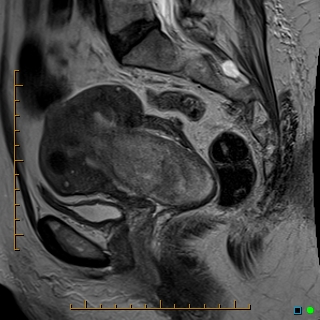Dysfunctional uterine bleeding MRI: Difference between revisions
Jump to navigation
Jump to search
No edit summary |
(added MRI finding details) |
||
| Line 9: | Line 9: | ||
MRI Findings | MRI Findings | ||
!Underlying Cause | !Underlying Cause | ||
! | !MRI | ||
!Findings | !Findings | ||
|- | |- | ||
| Line 19: | Line 19: | ||
|- | |- | ||
|'''[[Adenomyosis]]''' <ref name="“Radiopaedia”2">{{cite web|url=https://radiopaedia.org/articles/adenomyosis}}</ref> | |'''[[Adenomyosis]]''' <ref name="“Radiopaedia”2">{{cite web|url=https://radiopaedia.org/articles/adenomyosis}}</ref> | ||
| | |[[File:Adenomyosis-with-endometrioma-1.jpg|center|thumb|333x333px|Case courtesy of Dr Varun Babu, Radiopaedia.org, rID: 43504]]<br /> | ||
[ | |||
Case courtesy of Dr Varun Babu, Radiopaedia.org, rID: 43504 | |||
<br /> | |||
|<br /> | |<br /> | ||
| Line 33: | Line 28: | ||
|'''[[Leiomyoma]]''' <ref name="“Radiopaedia”3">{{cite web|url=https://radiopaedia.org/articles/uterine-leiomyoma}}</ref> | |'''[[Leiomyoma]]''' <ref name="“Radiopaedia”3">{{cite web|url=https://radiopaedia.org/articles/uterine-leiomyoma}}</ref> | ||
| | | | ||
Case courtesy of Dr Chris O'Donnell, Radiopaedia.org, rID: 22883 | <br />[[File:Prolapsing-uterine-leiomyoma.jpg|center|thumb|300x300px|Case courtesy of Dr Chris O'Donnell, Radiopaedia.org, rID: 22883]]<br /> | ||
<br /> | |||
| | | | ||
* only used for complex cases | |||
* may accurately determine size and location | |||
* appear hypervascular | |||
* helpful when surgery is considered or when trying to differentiate from fibroids | |||
|- | |- | ||
|'''[[Uterine cancer|Malignancy]]''' <ref name="“Radiopaedia”4">{{cite web|url=https://radiopaedia.org/articles/endometrial-carcinoma}}</ref> | |'''[[Uterine cancer|Malignancy]]''' <ref name="“Radiopaedia”4">{{cite web|url=https://radiopaedia.org/articles/endometrial-carcinoma}}</ref> | ||
| | | | ||
Case courtesy of Dr Bahman Rasuli, Radiopaedia.org, rID: 83200 | |||
<br /> | <br /> | ||
| | | | ||
* MRI may be helpful in improving accuracy for determining metastasis | |||
* normal tissue enhances more than malignant tissue | |||
|- | |- | ||
|'''PCOS''' | |'''[[PCOS]]''' <ref name="“Radiopaedia”5">{{cite web|url=https://radiopaedia.org/articles/polycystic-ovarian-syndrome-1}}</ref> | ||
| | | | ||
Case courtesy of Dr Mostafa El-Feky, Radiopaedia.org, rID: 53010 | |||
| | | | ||
* not a routine examination for PCOS | |||
* follicles will be seen on MRI | |||
|- | |- | ||
|''' | |'''Endometrial Causes''' <ref name="“Radiopaedia”6">{{cite web|url=https://radiopaedia.org/articles/endometrioma1}}</ref> | ||
| | | | ||
Case courtesy of The Radswiki, Radiopaedia.org, rID: 11397 | |||
| | | | ||
* Endometrioma appears hyperintense; the presence of hemorrhage results in a hypointense image | |||
|} | |} | ||
Revision as of 10:11, 9 March 2022
|
Dysfunctional uterine bleeding Microchapters |
|
Differentiating Dysfunctional uterine bleeding from other Diseases |
|---|
|
Diagnosis |
|
Treatment |
|
Case Studies |
|
Dysfunctional uterine bleeding MRI On the Web |
|
American Roentgen Ray Society Images of Dysfunctional uterine bleeding MRI |
|
Directions to Hospitals Treating Dysfunctional uterine bleeding |
|
Risk calculators and risk factors for Dysfunctional uterine bleeding MRI |
Editor-In-Chief: C. Michael Gibson, M.S., M.D. [1] Associate Editor(s)-in-Chief: Arooj Naz
Overview
MRI
| Underlying Cause | MRI | Findings |
|---|---|---|
| Endometrial Polyps [1] |  |
|
| Adenomyosis [2] |  |
|
| Leiomyoma [3] |
 |
|
| Malignancy [4] |
Case courtesy of Dr Bahman Rasuli, Radiopaedia.org, rID: 83200
|
|
| PCOS [5] |
|
|
| Endometrial Causes [6] |
|
|
References
- ↑ https://radiopaedia.org/articles/endometrial-polyp. Missing or empty
|title=(help) - ↑ https://radiopaedia.org/articles/adenomyosis. Missing or empty
|title=(help) - ↑ https://radiopaedia.org/articles/uterine-leiomyoma. Missing or empty
|title=(help) - ↑ https://radiopaedia.org/articles/endometrial-carcinoma. Missing or empty
|title=(help) - ↑ https://radiopaedia.org/articles/polycystic-ovarian-syndrome-1. Missing or empty
|title=(help) - ↑ https://radiopaedia.org/articles/endometrioma1. Missing or empty
|title=(help)